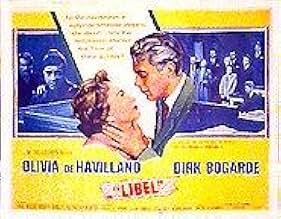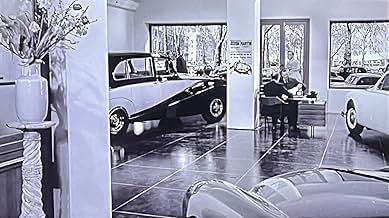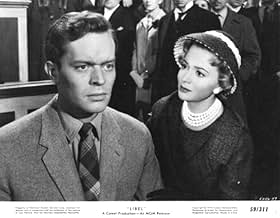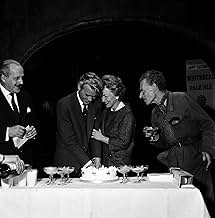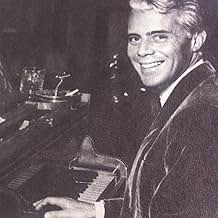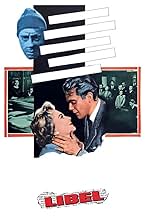CALIFICACIÓN DE IMDb
7.2/10
1.7 k
TU CALIFICACIÓN
Un excompañero acusa a un veterano de la Segunda Guerra Mundial con problemas de memoria de ser un impostor.Un excompañero acusa a un veterano de la Segunda Guerra Mundial con problemas de memoria de ser un impostor.Un excompañero acusa a un veterano de la Segunda Guerra Mundial con problemas de memoria de ser un impostor.
- Dirección
- Guionistas
- Elenco
- Nominado a 1 premio Óscar
- 1 nominación en total
Wilfrid Hyde-White
- Foxley
- (as Wilfrid Hyde White)
- Dirección
- Guionistas
- Todo el elenco y el equipo
- Producción, taquilla y más en IMDbPro
Opiniones destacadas
This movie employs good actors, particularly some of the great English character actors of the time. However, the premise of the plot- one person changing identities with another, ruined the movie for me. What I don't understand, and wish some other movie buff could explain, how do writers get paid for stories when they show an complete lack of basic understanding of the military. Even way back in WWII, English soldiers were fingerprinted, and most soldiers wore their dog tags religiously, particularly those who served in combat. I would imagine a baron would be particularly concerned that his remains arrive back in the family plot. These two facts of military life were never explained. The final insult to our intelligence came when a uniform of a near comatose patient is presented in the court room. Since the war ended in 1945, and the setting of the movie was contempory (1959), 14 years had elapsed. What happened to the soldier's identification tags? What efforts had been made to notify the patient's family? In real life, the question of responsibility would have generated a search to determine whether the patient was a British soldier. The two main characters were captured at the evacuation at Dunkirk, often referred as the Miracle of Dunkirk because 400,000 soldiers did excape. The number of majors captured at Dunkirk would have been relatively small, and if a hospital was stuck with a patient for long term care, it stands to reason a serious effort would be made to determine who their patient was.
Updated to make the protagonists be World War II veterans instead of World War I, Libel made its Broadway debut in 1935 after a run in London and ran for 159 performances during the 1935-36 season. Playing the role Dirk Bogarde does here was the screen's original Dr. Frankenstein, Colin Clive.
As for Bogarde due to movie screen magic he gets to play two roles, the respected titled English Lord with American wife Olivia DeHavilland and a Canadian fellow prisoner of war who was a traveling player and who looks like him. Worse than that, we see in flashback how he envied him.
Into their happy lives intrudes another former POW Paul Massie who knew both men in the camp and makes the startling accusation that the one stole the identity of the other who died during the war. This indeed is a case of Libel and one for the courts to straighten out.
Bringing the suit on Bogarde's behalf is Robert Morley and defending Massie is Wilfrid Hyde-White, they make a fine pair of antagonists. What is the truth, for that you have to watch Libel.
Though Olivia is first billed, the film clearly belongs to Dirk Bogarde who delivers a fine poignant performance of a man tortured by doubt, there are things tucked away in his mind that he prefers not dealing with. Olivia gets her innings in when even she starts to doubt the identity of the man she's been married to.
This film also gives we Yanks a chance to see Richard Dimbleby who was a combination of Edward R. Murrow and Walter Cronkite, that kind of trusted voice of the British Empire for the BBC. In fact Dimbleby is hosting Bogarde and DeHavilland on a tour of their mansion when Massie spots them on a bar television and sets everything in motion.
Libel holds up very well today it could probably be easily remade for something like the Iraq or Afghan war in about 15 years time.
As for Bogarde due to movie screen magic he gets to play two roles, the respected titled English Lord with American wife Olivia DeHavilland and a Canadian fellow prisoner of war who was a traveling player and who looks like him. Worse than that, we see in flashback how he envied him.
Into their happy lives intrudes another former POW Paul Massie who knew both men in the camp and makes the startling accusation that the one stole the identity of the other who died during the war. This indeed is a case of Libel and one for the courts to straighten out.
Bringing the suit on Bogarde's behalf is Robert Morley and defending Massie is Wilfrid Hyde-White, they make a fine pair of antagonists. What is the truth, for that you have to watch Libel.
Though Olivia is first billed, the film clearly belongs to Dirk Bogarde who delivers a fine poignant performance of a man tortured by doubt, there are things tucked away in his mind that he prefers not dealing with. Olivia gets her innings in when even she starts to doubt the identity of the man she's been married to.
This film also gives we Yanks a chance to see Richard Dimbleby who was a combination of Edward R. Murrow and Walter Cronkite, that kind of trusted voice of the British Empire for the BBC. In fact Dimbleby is hosting Bogarde and DeHavilland on a tour of their mansion when Massie spots them on a bar television and sets everything in motion.
Libel holds up very well today it could probably be easily remade for something like the Iraq or Afghan war in about 15 years time.
Having just seen "Libel" on TCM, I was pleasantly surprised....certainly, it is not a great film, but still was very entertaining, and the settings were extremely well done. The story line has been done before, but the acting of some very good English stalwarts plus Olivia de Havilland as an American wife to an English Baron, makes it well worth watching. Dirk Bogarde (never a favourite of mine) does an excellent job in a dual role, and is ably supported by Robert Morley, Paul Massie and Wilfred Hyde-White. There is no doubt that the producers of this film have come up with a film that still stands up today, and be proud of the end result. There are some very clever twists and the use of flash-backs was excellent. I can recommend this to everyone
This Anthony Asquith directed movie is one of Dirk Bogarde's finest movies. I would rank up there with Bogarde's performance in Victim (1961). Here, he plays the double role of portraying Sir Mark Loddon and his POW look-alike, Frank Welney.
As the movie begins, one of his fellow POWs, Jeffrey Buckernham (Paul Massie) sees Loddon on TV giving a tour of his plush country estate with his American wife, Lady Loddon (Olivia de Havilland). Convinced that Loddon is Welney, Buckenham arranges to have a newspaper call him out which, in turn, forces Loddon to sue the newspaper for libel. However, he, himself, is not totally convinced about his own identity in that there are certain blank spots in his memory resulting from his escape from the POW camp many years previously.
This is one of those great courtroom dramas in which the two opposing attorneys--Sir Wilfred (Robert Morley) represents Loddon and Wilfrid Hyde-White (Hubert Foxley) represents the defense for the newspaper in for Loddon's libel suit. Loddon's low point of the trial occurs when his own wife takes the stand, believing that he is not her husband.
As the movie begins, one of his fellow POWs, Jeffrey Buckernham (Paul Massie) sees Loddon on TV giving a tour of his plush country estate with his American wife, Lady Loddon (Olivia de Havilland). Convinced that Loddon is Welney, Buckenham arranges to have a newspaper call him out which, in turn, forces Loddon to sue the newspaper for libel. However, he, himself, is not totally convinced about his own identity in that there are certain blank spots in his memory resulting from his escape from the POW camp many years previously.
This is one of those great courtroom dramas in which the two opposing attorneys--Sir Wilfred (Robert Morley) represents Loddon and Wilfrid Hyde-White (Hubert Foxley) represents the defense for the newspaper in for Loddon's libel suit. Loddon's low point of the trial occurs when his own wife takes the stand, believing that he is not her husband.
Libel is directed by Anthony Asquith and adapted from Edward Wooll's play by Anatole de Grunwald and Karl Tunberg. It stars Dirk Bogarde, Olivia de Havilland, Paul Massie, Robert Morley, Wilfrid Hyde-White, Anthony Dawson and Richard Wattis. Music is by Benjamin Frankel and cinematography by Robert Krasker.
A shell-shocked ex-WWII prisoner of war with amnesia is accused of being an impostor by one of the guys he was imprisoned with. This sends him spinning into the middle of a Libel court case that could destroy everything in his life.
A splendidly stylish mystery/drama that offers up two Dirk Bogarde's for the price of one. The big question throughout is if Bogarde, in the shoes of Sir Mark Sebastian Loddon, is actually a doppleganger that he was in the war with called Frank Welney. Loddon has the riches, the estate and a beautiful loving wife, Welney was a struggling actor and something of a mischievous imp. The big narrative thrust is that Loddon is not sure himself, he can only remember certain things, thus we are never sure either as the plot twists and turns and the court case simmers away with dramatic force.
Bogarde is great in his dual role, with a voice change for each character and different hair styles to help the viewers differentiate. In the court we have a trio of classy character actors, with Hyde- White and Morley as the opposing lawyers (wonderful to witness this) and Watiss as the judge presiding over the trial. Havilland isn't asked to do much until late in the day, but then she shines bright and puts some emotional punch into proceedings. The great Krasker photographs it in crisp black and white, while Asquith directs with a smoothness that undercuts the coincidences and conveniences that exist in this sort of story.
All the highlights of a court room drama are here, and it's a cracking mystery to boot. 8/10
A shell-shocked ex-WWII prisoner of war with amnesia is accused of being an impostor by one of the guys he was imprisoned with. This sends him spinning into the middle of a Libel court case that could destroy everything in his life.
A splendidly stylish mystery/drama that offers up two Dirk Bogarde's for the price of one. The big question throughout is if Bogarde, in the shoes of Sir Mark Sebastian Loddon, is actually a doppleganger that he was in the war with called Frank Welney. Loddon has the riches, the estate and a beautiful loving wife, Welney was a struggling actor and something of a mischievous imp. The big narrative thrust is that Loddon is not sure himself, he can only remember certain things, thus we are never sure either as the plot twists and turns and the court case simmers away with dramatic force.
Bogarde is great in his dual role, with a voice change for each character and different hair styles to help the viewers differentiate. In the court we have a trio of classy character actors, with Hyde- White and Morley as the opposing lawyers (wonderful to witness this) and Watiss as the judge presiding over the trial. Havilland isn't asked to do much until late in the day, but then she shines bright and puts some emotional punch into proceedings. The great Krasker photographs it in crisp black and white, while Asquith directs with a smoothness that undercuts the coincidences and conveniences that exist in this sort of story.
All the highlights of a court room drama are here, and it's a cracking mystery to boot. 8/10
¿Sabías que…?
- TriviaThe original Broadway production of "Libel", produced in 1935, was directed by Otto Preminger, years before he made his Hollywood debut as a movie director.
- ErroresIn opening credits, Arthur Davey is listed as In Charge of Adminstration; no way of missing the obvious error - it takes up half the screen; of course, it should be Administration. How can such glaring errors be missed by editors.
- ConexionesReferences Apasionada (1952)
Selecciones populares
Inicia sesión para calificar y agrega a la lista de videos para obtener recomendaciones personalizadas
- How long is Libel?Con tecnología de Alexa
Detalles
- Fecha de lanzamiento
- Países de origen
- Idiomas
- También se conoce como
- Libel
- Locaciones de filmación
- Piccadilly Circus, Piccadilly, Londres, Inglaterra, Reino Unido(opening scenes, establishing shot)
- Productora
- Ver más créditos de la compañía en IMDbPro
Taquilla
- Presupuesto
- USD 615,000 (estimado)
- Tiempo de ejecución1 hora 40 minutos
- Color
- Mezcla de sonido
- Relación de aspecto
- 2.00 : 1
Contribuir a esta página
Sugiere una edición o agrega el contenido que falta

Principales brechas de datos
By what name was La noche es mi enemiga (1959) officially released in India in English?
Responda
